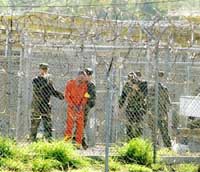Number of Guantanamo prisoners of hunger-strike doubles in one month
The number of Guantanamo Bay detainees participating in a hunger strike has more than doubled since a month ago to 11, including five who are being force-fed, the U.S. military said.

Military officials describe the hunger strike as an attempt to build public sympathy and opposition to the detention center, which this week marks its fifth anniversary of existence at the isolated U.S. military base in Cuba. But human rights groups say the strike reflects prisoners' despair.
"I don't see it as at all curious that they should be desperate enough to starve themselves," Jumana Musa, advocacy director for Amnesty International USA, said Monday.
The number of participants stood at five just one month ago, officials said. No information on who the new hunger strikers are was immediately available. The military rarely releases details on individual detainees, the AP reports.
The jump in the number of strikers comes as Guantanamo's critics are using its fifth anniversary on Thursday to call for the prison to close.
The U.S. government says it needs to keep men deemed "enemy combatants" under guard, but many prisoners protest they are innocent. Guantanamo Bay received its first prisoners on Jan. 11, 2002, and currently holds about 395 foreign men on suspicion of links to al-Qaida or the Taliban.
Among the hunger strikers are two prisoners who began refusing food in August 2005, near the start of a hunger strike that reached a peak participation of 131 that year, according to Navy Cmdr. Robert Durand, a Guantanamo Bay spokesman. Most detainees abandoned the protest as the military adopted more aggressive force-feeding methods, including a restraint chair, the AP says.
The military classifies a detainee as a hunger striker after he refuses nine consecutive meals. Most begin eating again before they are subjected to force-feeding, officials told reporters at the U.S. naval base last month.
Those on the hunger strike have not made any specific demands or requests, Durand said.
"The hunger strike technique is consistent with Al-Qaida practice and reflects detainee attempts to elicit media attention to bring international pressure on the United States to release them back to the battlefield," he said.
Subscribe to Pravda.Ru Telegram channel, Facebook, RSS!




